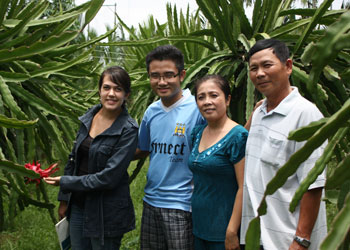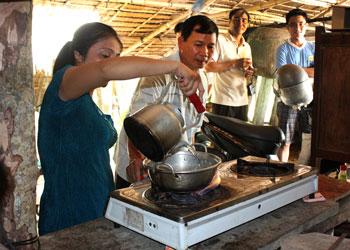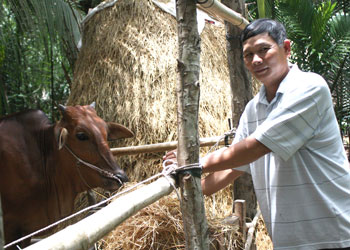Story by Maria Wrabe | Volunteer | Heifer Vietnam
Photos by Nguyen Xuan Quyen | Commincation Networking Officer | Heifer Vietnam
 |
|
What do dragon fruit trees, pig manure, cement and tour guides have in common? They are all part of one Vietnamese family’s plan to expand, improve and impact.
Tran Thi Cuc Huong, 45, is a primary school teacher, and her husband, Nguyen Van Lieu, 54, is a farmer. They joined the project Improving Livelihoods in the Poorest Districts of Tra Vinh Province unofficially in May of 2012, after another project family forfeited their cow.
This family is constantly innovating, building on old methods while implementing new business and environmental conservation techniques. They have used the support of Heifer Vietnam to enhance their efforts, with very promising results.
When Huong and Lieu married, they received about an acre of land from Lieu’s parents. The land was originally threaded with canals and lined with mangrove trees, but the couple used their savings to fill in the canals and began growing coconuts and dragon fruit, raising chickens and pigs, and cultivating papaya, sweet potato and morning glory.
After joining the Heifer project in 2012, the couple saw that they needed to improve production to keep up with the rising cost of living and to pay for their new house. They were eager to find that Heifer’s assistance included value-based trainings and technical trainings, which have been useful in their production and in their personal lives.
 |
|
They realized their pond and surrounding canals were becoming severely polluted by the waste from their pigs and other animals. They had seen a biogas system on television, and after consulting with their friends and examining the system in other households, they decided that they would implement the system. The biogas system turns pig manure into methane, which is then used for cooking and electricity. It is becoming more and more popular in the Mekong Delta as a way to not only prevent the pollution of fish ponds and canals but also to create an environmentally sustainable source of electricity.
The Heifer project offered additional financial support to farmers with feasible business plans and farming models in order to boost multiplication in the community. Seizing this opportunity, the couple submitted their proposal, under the supervision of the project partner, and they received 10 million Vietnamese dongs, or about $480, from the project. They used 3 million dongs, or about $143, to install a biogas system and 7 million dongs, or about $335, to expand their dragon fruit garden. Normally they would have had to wait for several months, if not a year, to save up enough money to invest like this, but with Heifer’s assistance, they were able to develop the system within a few months.
 |
|
The pig manure is now used to make biogas, and they were able to fill in the fish pond that had originally served as a pig manure receptacle and plant more dragon fruit trees in the new space. Huong proudly and graciously offered us generous slices of bright pink dragon fruit, speckled with black seeds, fresh from the garden.
Huong said that they intend to use the money gained from the extra dragon fruit trees and the money saved from buying wood and fuel for cooking to invest in building a cement bridge, making it easier for people to come to their house and buy their products. Once again, they have a mind to expand.
They are not satisfied, however, with improving just their lives; they intend to use their knowledge and experience to reach out to the rest of the community. “We work to improve ourselves and share our knowledge and skills with other people. That is how we help other people and help ourselves,” Huong said.
This life of evolution encompasses the relationship between mother and son, as well. Huong completed studies at a university, majoring in primary education, and now teaches English to young, eager students. She answered a few of our questions in English, proud of her abilities. But, she is even prouder of her son, Nguyen Dang Khoa, 24. Inspired by his mother's love for English and education, he transformed that passion into a successful career as a tour guide. The family’s table is covered with pictures of him posing with foreigners and Vietnamese alike at all the famous sites around Vietnam.
Heifer has augmented and fostered this innovative family’s constant evolution. Huong shared her secret for success: “First, you must work hard. Second, you must continue to study and keep updated with modern technical knowledge from television, radio and newspapers. Third, you must think of creative ideas for business. And last, you must attend all Heifer trainings, because they bring everything together.”